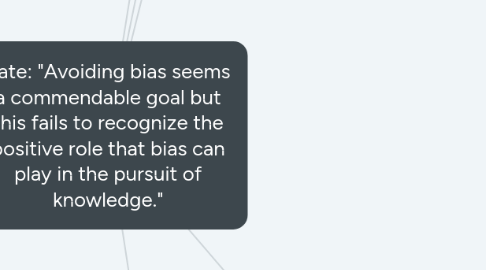
1. keywords
1.1. bias
1.1.1. prejudice against or in favour of a person, idea, event
1.2. positive
1.2.1. beneficial, desireable
1.3. knowledge
1.3.1. facts evidently verified to be true and accurate based on experience and authoritative sources
1.4. commendable
1.4.1. praised, viewed as proper and admirable
1.5. goal
1.5.1. a desirable outcome which you are trying to reach and achieve
1.6. recognise
1.6.1. approve, accept, acknowledge
2. key phrases
2.1. avoid bias
2.1.1. present something in an objective way, free from personal preferences, beliefs, interpretations
2.2. positive role
2.2.1. beneficial contribution
2.3. pursuit of knowledge
2.3.1. acquisition of verified facts and accurate information
3. Rewrite
3.1. It is seen as a good thing to describe and communicate/ share facts in an objective way that is not affected by our personal interpretations and preferences, however, this leads to us ignoring the possible benefits of biased opinions in our understanding of a situation or acquisition of knowledge-information
4. Rewrite
4.1. History
4.1.1. biases in sources can be useful as they reveal a lot about the authors or the sides they are referring to, but the value of the source can be decreased as well as many expect due to the fact that there might not be a representation of all perspectives o
4.2. Human Sciences
4.2.1. biases help us understand how humans react and how to perceive things, but at the same time biases used in this AOK might show us the desirable goals but not the reality
5. Connections to Classes
5.1. Subject 1:History
5.1.1. AOK: History
5.1.2. Claim: Bias can be useful and help us acquire more knowledge that we might not have expected
5.1.2.1. Historians don't expect all sour es to be free of bias, since that is very possible to happen. One example of a biased source is the proclamation of Zeng Guofan (A Qing official in China) against the Taiping leaders during the Taiping rebellion (who wanted to overthrow the dunasty).
5.1.2.1.1. TOK concepts
5.1.2.1.2. Framework Area
5.1.2.1.3. a biased source that doesn't reflect objectively the rebellion and its actions, but it is useful because it shows how imperial Qing authorities perceived it and how they reacted
5.1.3. CC: {bias can provide us with further information but it decreases the value of a source as it provides different knowledge than that we were looking for, hence it might not be beneficial to us}/ bias can provide us with further information but it can decrease the value of a source if there is a lack of enough sources to compare it with, and hence figure out the extent of the bias
5.1.3.1. lliad of Homer
5.1.3.1.1. TOK concepts
5.1.3.1.2. Framework Area
5.1.3.1.3. it provides information about the time the author lived but not accurate information about the Trojan war
5.1.3.1.4. "Homer's Accuracy." Martin Taylor, mmtaylor.net/Holiday2000/Legends/Homer.html.
5.2. Subject :Global Politics (It won't be used)
5.2.1. AOK: Human Sciences
5.2.2. C: bias can be beneficial as it provides us with knowledge and possible perspectives
5.2.2.1. 'Hope'poster of Obama in 2008
5.2.2.1.1. perspectives, interpretation, value, hypothesis, facts, explanation, bileif
5.2.2.1.2. Framework Area
5.2.2.1.3. helps us understand how Obama was viewed by many people in the US and around the world probably and why he was elected as the president
5.2.3. bias offers information but it doesn't reflect the reality entirely
5.2.3.1. 'We can do it' poster showing a strong woman
5.2.3.1.1. hypithesis, value, subjectivity, objectivity, interpreation reliability
5.2.3.1.2. Framework Area
5.2.3.1.3. this poster illustrates how Americans and the government tried to gain the support and help of women in the war but we can't be sure that women were really viewed and treated like that
5.3. Subject 3: Global Politics
5.3.1. AOK: Human Sciences
5.3.2. C: bias can be beneficial sometimes as it can lead individuals to be more expert on a field and produce/share more knowledge
5.3.2.1. Varoufakis speech:
5.3.2.1.1. TOK concepts:
5.3.2.1.2. Framework Area
5.3.2.1.3. Varoufakis: very passionate about the failure of banking system in Europe and was expert in this field, hence producing knowledge and gaining the support of the people
5.3.3. CC: bias can be useful, however it can prevent people from taking into consideration other perspectives as they might be too dedicated in a field
5.3.3.1. politician too passionate about an event/ reform that they ignore other perspectives
5.4. Subject 4: sciences
5.4.1. AOK: natural sciences
5.4.2. C: bias can be beneficial in natural sciences as passionate scientists can convince people about the validity of scientific facts and prevent the misinformation and spread of inaccurate claims presented as facts. Moroever, passion can motivate people to commit to sciences and hence achieve production of knowledge.
5.4.2.1. Neil Degrasse Tyson: an astrophycisist known for his passion for science and for popularising this field, hence causing controversy and raising awareness about scientific discoveries/facts
5.4.2.1.1. TOK concpets:
5.4.3. CC: bias can be useful as it motivates people to dedicate in something and discover or produce knowledge. However, sometimes it can lead to the production and communication of inaccurate information which verify a personal perspective (experimenter bias).
5.4.3.1. Samuel Morton, a physician, and natural scientist, affected by his surrounding in which African Americans were considered inferior, conducted research to demonstrate that white people have bigger brains than dark races. His experiment, which verified his hypothesis, was later rejected when repeated by people who were not aware of what race each skull belonged to.
